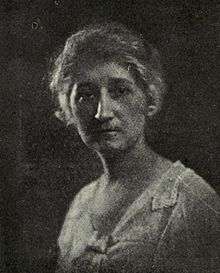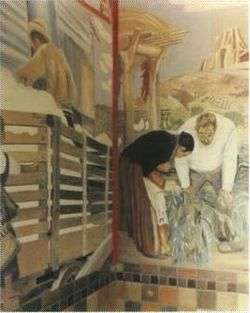Olive Rush
| Olive Rush | |
|---|---|
 Olive Rush, c. 1921 | |
| Born |
June 10, 1893 Fairmount, Indiana |
| Died |
August 20, 1966 (aged 73) Santa Fe, New Mexico |
| Resting place | Park Cemetery, Fairmount, Indiana |
| Nationality | American |
| Alma mater | Earlham College |
| Known for | Painting |
Olive Rush (June 10, 1873 near Fairmount, Indiana – August 20, 1966 in Santa Fe, New Mexico) was an illustrator, muralist, and an important pioneer in Native American Art Education.
Education
Raised as a Quaker, Olive Rush studied at Earlham College, the art school associated with the Corcoran Gallery of Art and at the Art Students League before becoming an illustrator in New York in 1895.[1] She was well known for her portraits and paintings of children and women, many of which were featured in magazines such as Woman's Home Companion and St. Nicholas. In 1904 she moved to Wilmington, Delaware, to study with Howard Pyle, and she stayed until 1910. She spent the next year in Europe studying British and French painters, and finished her art education at the Boston Museum School in 1912. In 1913 Rush returned to Europe with her friend, the watercolorist Alice Schille, visiting Belgium and France.
Career
In 1914 Rush, with her father, visited New Mexico and Arizona, and she had a one-person exhibition at the Palace of the Governors in Santa Fe. She made several visits to New Mexico over the next couple of years and moved permanently to Santa Fe in 1920. Despite the relative isolation of Santa Fe, Rush continued to contribute to national and international shows over the next thirty years, which activity culminated in a retrospective at the Museum of New Mexico Art Gallery in 1957.
Her former studio on Canyon Road in Santa Fe is now the home to the Santa Fe Quaker Meeting, as well as having guest house facilities available on the site.
Rush considered her major influences to be early Chinese art, Japanese art, and El Greco.[2] She was also inspired by the colorful style of Hopi and other Puebloan artists of the 1930s and 1940s.[3]
Murals
Murals were produced from 1934 to 1943 in the United States through the Section of Painting and Sculpture, later called the Section of Fine Arts, of the Treasury Department. The murals were intended to boost the morale of the American people from the effects of the Depression by depicting uplifting subjects.[4] Almost 850 artists were commissioned to paint 1371 murals, most of which were installed in post offices, libraries, and other public buildings.[5] 162 of the artists were women. The murals were funded as a part of the cost of the construction with 1% of the cost set aside for artistic enhancements.[5]
Olive Rush was commissioned by the Section of Fine Arts to complete painted murals for several public buildings in the American West. The Library Reaches the People, a fresco, was painted in the Santa Fe, New Mexico Fray Angelico Chavez History library; an oil on canvas mural, Osage Treaties was completed for the Pawhuska, Oklahoma post office; Antelope was painted for the post office in Florence, Colorado; and 2 frescos, Cotton Industry and Farming and Natural History of Plant and Animal Life were created for the Foster Hall Biology Building at New Mexico State University. Santa Fe's New Mexican Room in the La Fonda on the Plaza Hotel features murals painted by Olive Rush in 1929.[6] She taught mural painting to students at the Santa Fe Indian School, which is now the Institute of American Indian Arts.
Museum and Gallery Holdings
Houston (MFA): The Huntress (c. 1938, watercolour)
Indianapolis (MA): Woman at Loom (c. 1907, oil on academy board); On the Balcony (oil on canvas)
Lincoln (Sheldon Memorial AG, University of Nebraska): Food Bearers (1923, oil on canvas)
New York (Brooklyn Mus.): Deer Path (watercolour)
Norman (Fred Jones Jr. MA, University of Oklahoma): The White Sands (with fox) (c. 1925, oil on panel)
Roswell (Mus. and Art Center): Weird Land (c. 1934); The Apple from the Sea Returning (c. 1935, watercolour)
Santa Fe (Mus. of New Mexico, MFA): collection of works, including After War - Frustration (oil); Indian Children at San Xavier (oil); Portrait of Mary Austin (c. 1933); Viaducts and Villages (c. 1950, watercolour)
Washington DC (Phillips Collection): On the Mesa (c. 1925, oil on cardboard); Charros at Rodeo (1929, watercolour on board)
Washington DC (Smithsonian American AM): Olive Rush papers, 1879-1967
Wilmington (Delaware AM): Gazelle Grazing (oil); Interior of the Howard Pyle Studio (c. 1911, watercolour and pastel)
Worcester (AM): Edge of the Forest (c. 1928, watercolour); Fallow Deer (c. 1928, watercolour over graphite)[7]
References
- ↑ Abatemarco, Michael (December 5, 2015). "A Hoosier in Santa Fe: Artist Olive Rush". McClatchy-Tribune Business News. Tribune Content Agency LLC. Retrieved March 7, 2015.
- ↑ Rush, Olive (1957). Olive Rush Paintings. Santa Fe: Museum of New Mexico Art Gallery.
- ↑ Booker, Margaret M. "Hopi". Grove Art Online. University Oxford Press. Retrieved March 7, 2015.
- ↑ Rediscovering the People's Art: New Deal Murals in Pennsylvania’s Post Offices". Pennsylvania Historical and Museum Commission: 2014.
- 1 2 University of Central Arkansas. "Arkansas Post Office Murals".
- ↑ "A Story in Every Room" (PDF). lafondasantafe. La Fonda on the Plaza Hotel. Retrieved 22 January 2015.
- ↑ "Rush, Olive" Oxford Art Online/Grove Dictionary of Art
Resources
- Cuba, Stanley L. (1992) Olive Rush: A Hoosier Artist in New Mexico, Minnetrista Cultural Foundation, Muncie, Indiana. ISBN 0-9623291-4-2
- New York Sun, March 17, 1933, p. 14.
- “Women Artists of Santa Fe” by Michael R. Grauer
- Newton, Judith Vale and Carol Ann Weiss. (2004) Skirting the Issue: Stories of Indiana's Historical Women Artists, Indiana Historical Society Press, Indianapolis. ISBN 0-87195-177-0
External links
 Media related to Olive Rush at Wikimedia Commons
Media related to Olive Rush at Wikimedia Commons- Olive Rush Papers Online at the Smithsonian Archives of American Art
- Santa Fe Friends (Quaker) Meeting at the Former Olive Rush Studio
- Santa Fe Hillside at New Mexico Museum of Art
